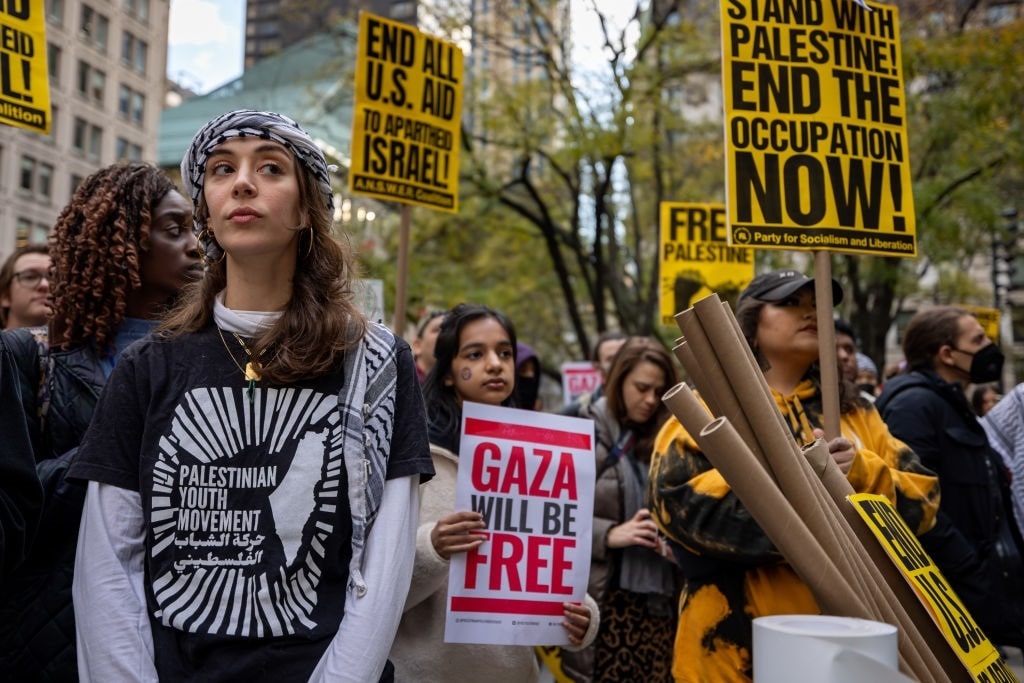It’s not novel, but it is effective.
Elizabethan era poet and playwright Christopher Marlowe reportedly said long ago, “Money can’t buy you love, but it improves your bargaining position.” Although there is some doubt about this attribution, you get the point. When US university campuses erupted in rabid protests on behalf of the Palestinian people, most Americans were caught off guard. It appeared antithetical to the long-held pro-Israel position by the government and people of the United States. It all seemed so sudden, but this pro-Arab sentiment has been building for some time. All one needs to do is follow the money.
Mind-bending amounts of cash have been flowing into college and university coffers from foreign countries for many years. Despite a legal requirement that these funds be reported, much of it has flown under the radar. However, the tentacles of these huge grants can be found if you know where to look.
Arab Money Buys Palestinian Love

(Photo by Michael Nigro/Pacific Press/LightRocket via Getty Images)
A dust-up regarding foreign money pouring into American universities was spotted in a 2020 Department of Education report under the direction of then-Secretary Betsy DeVos. It found $6.5 billion in undisclosed foreign money granted to institutions of higher learning. It is not illegal for other countries to give money to US schools, but if they donate more than $250,000, universities are required to identify it.
Flash forward to this year. A few conservative news outlets locked in on a report by the Network Contagion Research Institute (NCRI) showing that, between the years 2014-2019, a boatload of foreign money – to the tune of $13 billion – was given to more than 200 US colleges and universities. The largest donor is the country of Qatar, which gave, shall we say, generously. The study noted that the home of Hamas leaders made grants in excess of $2.7 billion.
Understanding that such vast amounts of money have been pouring into the US higher education sector raises the obvious question: Has it influenced academia and political sentiment on campuses? The NCRI report answers with a clear yes. The study found that between 2015 and 2020, “Institutions that accepted money from Middle Eastern donors, had, on average, 300% more antisemitic incidents than those institutions that did not.” Another disturbing finding noted: “Speech intolerance – manifesting as campaigns to investigate, censor, demote, suspend or terminate speakers and scholars – was higher at institutions that received undocumented money from foreign regimes.”
In the DeVos Department of Education report, schools identified another “6.6 billion from Qatar, China, Saudi Arabia, and the United Arab Emirates.” Notice it wasn’t all Mideast money that had the Trump administration anxious: China’s contributions were of particular concern. When President Trump tried to tamp it down, the Washington Examiner reported blowback from professors, leftist activists, and even from the Chinese Communist Party (CCP), causing the Biden Administration to scuttle Trump’s hardline initiative. While the large CCP grants to universities could ultimately prove to be a problem for the US, it is the vast amounts of Arab cash that lurk behind these Palestinian protests we see on campuses today.
Foreign actors spread the wealth, but they paid particular attention to the Ivy Leagues and other prestigious schools, including but not limited to the University of Pennsylvania, Harvard, Yale, Fordham, Stanford, Georgetown, Texas A& M, Rutgers, the University of Maryland, MIT, and – you guessed it – Cornell.* Their unassailable conclusion is that “foreign money and foreign interference to academic integrity” pose a threat to “free speech on campuses, and national security.”
Knowing this, is it any wonder these universities have largely been mum when pro-Palestinian protests take place on their campuses? Rule number one in fundraising is “Don’t bite the hand that feeds you.” Money may not be able to buy love, but it appears it can buy silence.
*It should be noted that in the case of Cornell, the anti-Semitic rhetoric was so vile the university president called in the police and the FBI.

